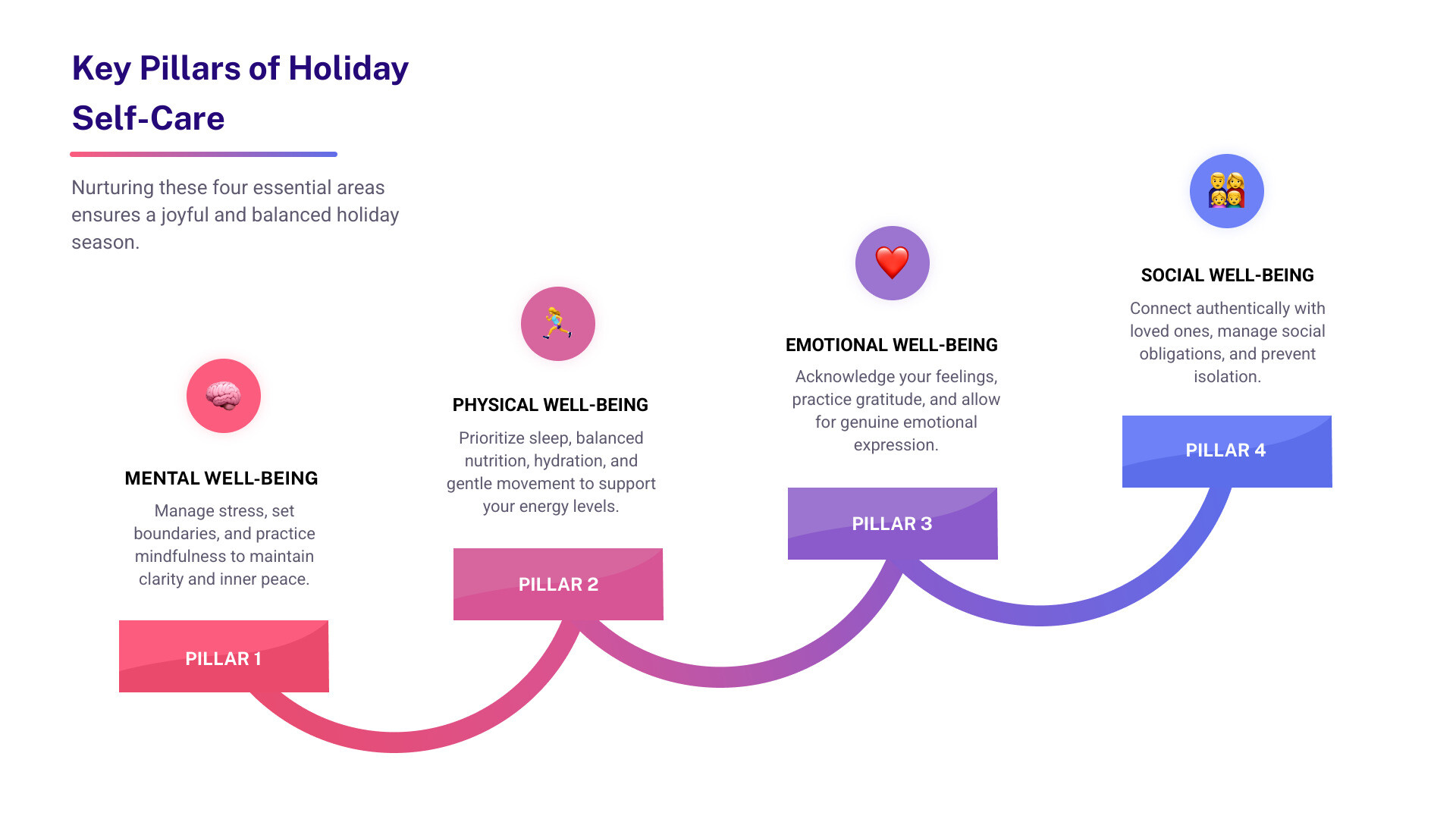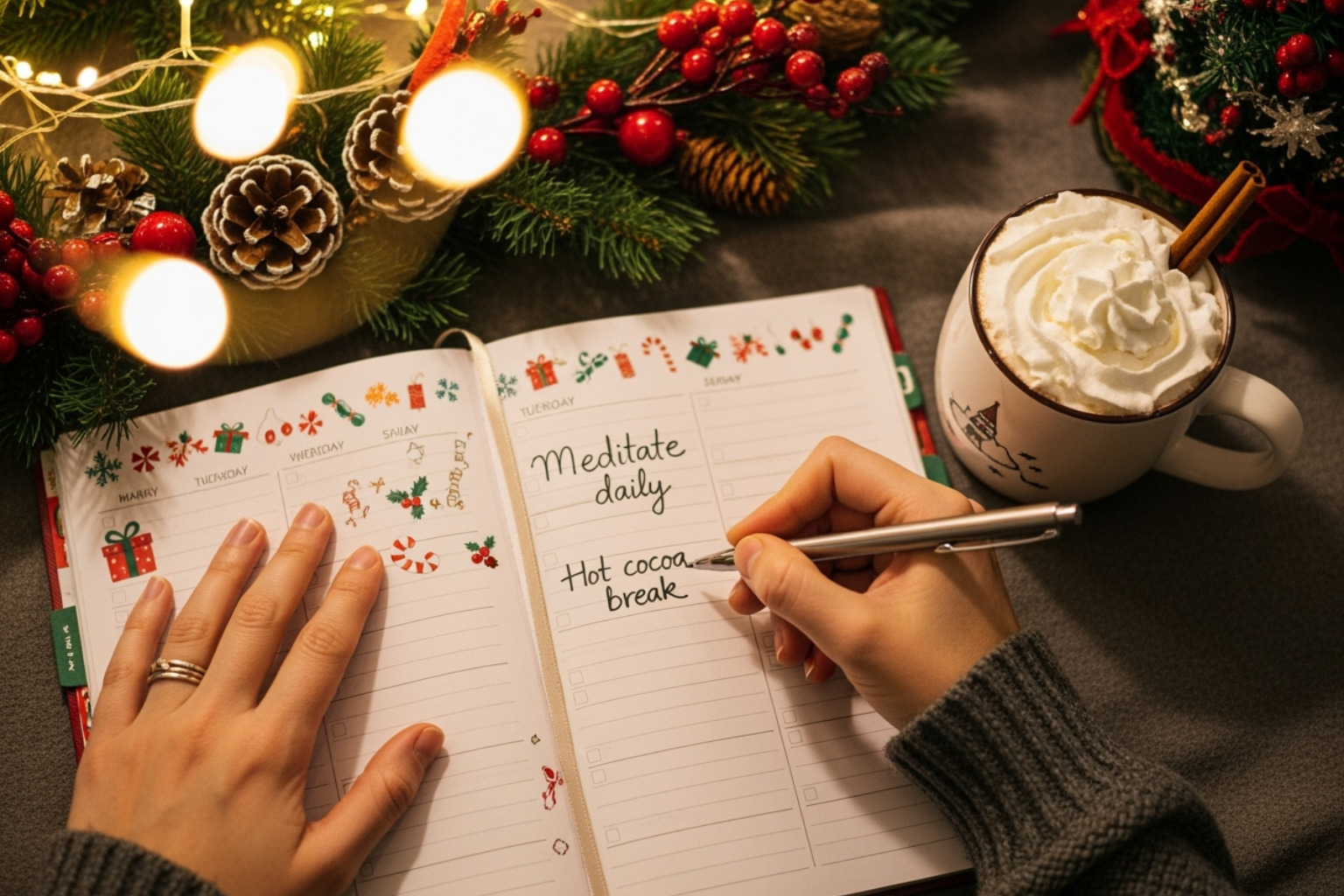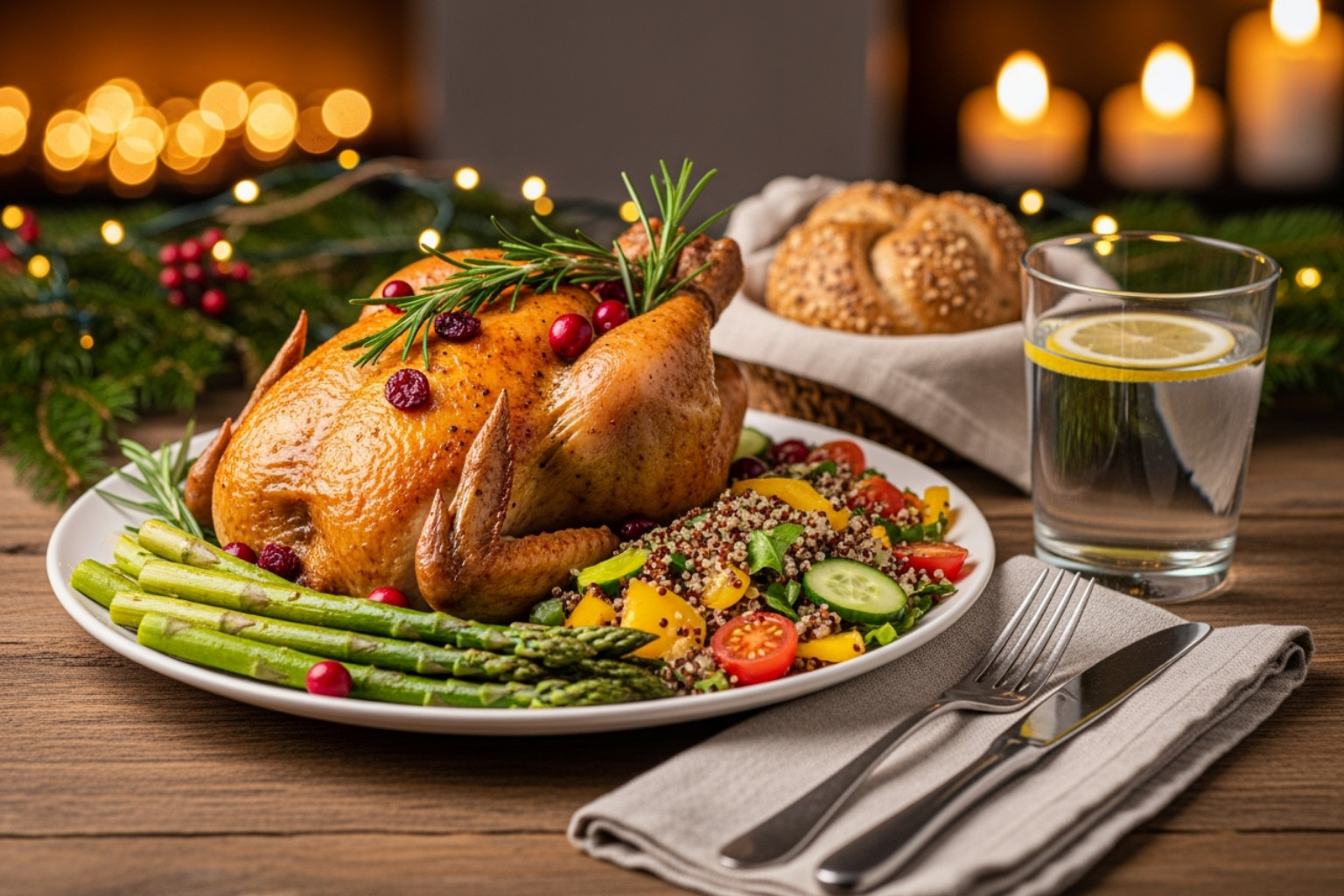Why Holiday Self-Care Keeps Your Spirits Bright
Navigating holiday self care is key to a joyful and balanced season. It means actively prioritizing your mental, physical, and emotional well-being during the busy holiday season.
- It’s about setting boundaries to protect your energy.
- It involves taking time to rest and recharge.
- It’s about making mindful choices that support your health.
- It allows you to be more present and genuinely enjoy the festivities.
The holiday season often feels like a whirlwind. It brings both excitement and pressure. From planning gatherings to managing budgets, the demands can be huge. In fact, nearly nine in 10 Americans feel stressed or overwhelmed during this time.
This constant push can leave you feeling drained. It’s like trying to pour from an empty cup. You simply can’t. That’s why the first gift you give this season should be to yourself.
Just like on an airplane, you must put on your own oxygen mask first. Only then can you help others. This holds true for your well-being during the holidays. Taking care of yourself means you can truly show up for loved ones. It lets you enjoy the magic of the season without burnout.
Self-care isn’t selfish. It’s essential. It benefits everyone around you. It allows you to maintain balance and keep your inner glow shining bright.

Holiday self care further reading:
Fortify Your Peace: Setting Boundaries and Realistic Expectations
The holidays sparkle with promise, but they often come wrapped in unrealistic expectations. We picture ourselves hosting the perfect dinner party, finding just the right gifts for everyone, and radiating joy from Thanksgiving through New Year’s. But here’s the reality check: nearly nine in 10 Americans feel stressed during this season. That’s why holiday self care starts with ditching perfectionism and setting boundaries that actually protect your peace.
Let’s be honest about those picture-perfect holiday fantasies. Social media doesn’t help, showing us endless streams of flawless decorations and beaming families. But real life is messier, and that’s perfectly okay. When we cling to impossible standards, we set ourselves up for disappointment and exhaustion.

The art of saying “no” gracefully becomes your superpower during the holidays. Your time and energy aren’t unlimited resources, even though the season might make you feel like they should be. When that invitation arrives for yet another holiday party, pause and ask yourself: Will this bring me joy or just add to my stress?
If the answer leans toward stress, it’s perfectly acceptable to decline. You might say something like, “Thank you for thinking of me, but I’m keeping my schedule lighter this year.” No elaborate excuses needed. Protecting your energy means being selective about where you spend it.
Managing social obligations also means getting creative with family time. If big family gatherings feel overwhelming, suggest smaller get-togethers or shorter visits. Drive yourself to events so you can leave when you need to. Steer family dynamics by agreeing beforehand to avoid hot-button topics, or simply excuse yourself when conversations turn uncomfortable.
You don’t have to participate in every family tradition that drains you. Maybe this year you skip the marathon cookie-baking session and opt for store-bought treats instead. Or perhaps you create personal traditions that actually nourish you – like a quiet evening with hot chocolate and your favorite holiday movie.
The goal isn’t to avoid all holiday activities. It’s to choose the ones that genuinely bring you joy while protecting yourself from the ones that don’t. This mindset shift is powerful: you’re not obligated to feel festive every moment of the season.
Acknowledge and Manage Difficult Emotions
Here’s something nobody talks about enough: the holidays can be emotionally complicated. While everyone around you seems to be radiating cheer, you might be dealing with holiday blues, loneliness, grief, or anxiety. You’re not broken, and you’re definitely not alone – 64% of people experience holiday blues at some point.
Holiday blues feel different from clinical depression, but they’re still real and deserve attention. Maybe you’re missing someone who won’t be at the table this year. Perhaps financial stress is weighing heavily on your mind. Or you might simply feel overwhelmed by all the expectations swirling around you.
The pressure to be constantly joyful during the holidays can make these feelings even harder to bear. But true holiday self care means allowing all feelings to exist without judgment. If you’re grieving a loss, the holidays might feel particularly difficult, and that’s completely natural. Your healing doesn’t pause for the calendar.
Grief during the holidays takes many forms. You might be mourning a loved one, a relationship that ended, or even the loss of traditions that no longer feel the same. It’s okay for your holidays to look different as you steer these feelings.
Journaling can become your emotional refuge during this season. When family dynamics get tense or when you’re feeling overwhelmed, writing down your thoughts helps you understand what’s really bothering you. Sometimes seeing your feelings on paper makes them feel more manageable.
Loneliness can feel especially sharp during a season that emphasizes togetherness. If you’re spending the holidays alone or feeling disconnected even in a crowd, acknowledge those feelings instead of pushing them away. Consider reaching out to friends, volunteering, or creating new traditions that honor where you are right now.
Anxiety about money, family gatherings, or living up to expectations is incredibly common. When anxious thoughts spiral, try grounding yourself in the present moment. What can you see, hear, or touch right now? This simple practice can help calm your nervous system.
You don’t have to fix all these feelings or make them disappear. Sometimes the most caring thing you can do is simply acknowledge them and be gentle with yourself as you move through them.
For inspiration on navigating emotional challenges and finding your way back to balance, read about From Burnout to Balance: One Woman’s Journey to Holistic Living.
Your Practical Holiday Self Care Toolkit
When the holiday season hits, it often feels like we’re caught in a whirlwind of to-do lists and expectations. But effective holiday self care means having a practical toolkit to manage stress and overwhelm, turning chaos into calm. Our goal is to empower you to prioritize your well-being amidst the hustle and bustle.

One of the most practical strategies is proactive planning and scheduling. Instead of reacting to demands, we can set aside dedicated time for self-care activities. This means carving out blocks in our calendar for rest, hobbies, or simply quiet moments. Don’t overschedule yourself; focus on activities that truly bring joy and rejuvenation. This also includes managing gift-giving by setting a budget and considering handmade or experience-based gifts to reduce financial stress. Simplifying travel, perhaps by minimizing stops or choosing direct routes, can also significantly cut down on holiday overwhelm.
Beyond the big picture, incorporating small, simple pleasures into our daily routines makes a huge difference. These are the moments that keep our spirits bright without requiring a major time commitment.
For a comprehensive approach to enhancing your well-being, explore The Ultimate Guide to Wellness and Well-Being.
Mindful Practices for Holiday Self Care
Mindfulness is about being present, fully aware of the moment without judgment. During the holidays, when our minds are often racing with to-do lists and future plans, mindfulness can be a powerful anchor. It helps us find pockets of calm amidst the storm, changing everyday tasks into acts of holiday self care.
One of the simplest yet most effective mindful practices is deep breathing. Just 10 minutes of daily deep, relaxing breathing can lower the stress hormone cortisol while elevating the “feel good” hormone serotonin. It’s a quick way to decompress and unwind, helping us to stay grounded when things feel chaotic. We can practice this while sipping a beverage, folding laundry, or even waiting in line. The key is to slow down and focus on our breath.
To dig deeper into the transformative power of breath, check out The Power of Breathwork for Wellness and Inner Glow.
Another cornerstone of mindful holiday self care is gratitude. Directing our attention towards what we’re thankful for is scientifically proven to make us healthier, more energetic, less stressed and anxious, and helps us get better sleep. We can start a gratitude journal, listing simple blessings like the warmth of a cup of coffee or a quiet evening at home. Even in challenging moments, finding small things to appreciate can shift our perspective and cultivate a more positive outlook.
Finally, engaging all our senses can bring us into the present moment. This might mean savoring the smell of pine, listening to our favorite holiday music, enjoying the taste of a festive treat mindfully, or feeling the warmth of a cozy blanket. These sensory experiences help us connect with the joy of the season rather than getting caught up in the commercialism or endless tasks.
For more ways to bring intention and presence into your daily routine, explore Mindful Beauty Routines.
A Simple Holiday Self Care Routine for Busy Days
Even when our schedules are packed, incorporating small, consistent self-care actions can prevent burnout and keep our spirits bright. We don’t need hours; even five minutes can make a difference in your holiday self care routine.
Consider taking a short walk; stepping outside for just 5-10 minutes can clear your head and boost your mood. Even a walk around the block can be incredibly refreshing. Perhaps put on your favorite calming tunes or festive melodies. Music has a powerful effect on our emotions and can be a quick way to shift our mindset.
Think about a digital detox. The holidays can be a time of hyper-connectivity, leading to digital overwhelm. Consider an “internet-lite” holiday by setting boundaries for screen time. Maybe we can put our phones away an hour before bed or commit to certain screen-free times during the day. This helps us be more present and reduces comparison culture.
Don’t forget simple budgeting tips for the holidays. Financial stress is a major contributor to holiday overwhelm. We can proactively manage this by setting a strict budget and sticking to it. This might mean considering handmade gifts, planning meals in advance, or opting for experience-based presents rather than material ones. “Later comes sooner than you think” when it comes to splurging beyond our means. Avoid that post-holiday financial hangover by being mindful with our spending now.
For more ideas on how to weave wellness into your busy life, check out 5-Minute Wellness Tips for Busy Women.
Nourish to Flourish: Prioritizing Your Physical Well-being
When the holiday season arrives, our routines often get tossed out the window. It’s easy to let go of the healthy habits that keep us feeling our best. But here’s a secret: taking care of your body is a huge part of effective holiday self care. In fact, your physical well-being is deeply connected to how you feel mentally and emotionally.

Think about it: when you’re well-rested, nourished, and moving your body, you handle stress so much better. Regular exercise, for instance, isn’t just about fitness; it’s a powerful mood booster! It helps reduce anxiety and stress by releasing those wonderful “feel-good” hormones. On the flip side, not getting enough sleep can make stress feel overwhelming and even worsen feelings of anxiety or sadness. And when it comes to food, it’s all about finding that sweet spot of balance and moderation. Yes, enjoy those festive treats, but remember to fuel your body with good nutrients and plenty of water too.
Sleep, Nutrition, and Movement
Let’s explore how you can prioritize these key areas for a truly joyful holiday season.
Prioritizing Rest: Sleep is often the first thing to go during the holiday rush, with late nights and early mornings becoming the norm. But consistently getting enough shut-eye is absolutely critical for managing stress and keeping your spirits bright. Try to stick to a consistent sleep schedule as much as you can. Create a relaxing bedtime routine – maybe a warm bath or a good book instead of screen time. And if a full eight hours isn’t always possible, don’t underestimate the power of a short, restorative nap. You might even swap some of that phone scrolling time for a quick power nap!
Balancing Festive Foods: The holidays are famous for their delicious food and drinks, and you should absolutely enjoy them! The trick is practicing moderation. Instead of feeling guilty or deprived, focus on mindful eating. Fill your plate with nutritious options first, then savor smaller portions of those special holiday treats. And remember to stay hydrated! Drinking plenty of water throughout the day is especially important, even more so if you’re enjoying some festive beverages.
Creative Ideas for Holiday Exercise: Your usual gym routine might be hard to keep up with, but there are so many fun ways to stay active during the holidays. Why not gather family and friends for a brisk walk to admire the holiday lights, or even an impromptu dance party in the living room? Simple activities count too – like playing in the snow with kids, or helping haul firewood. The goal isn’t to run a marathon, but to keep your body moving. Even just 10 or 15 minutes of activity can release tension and give your mood a wonderful boost.
By taking care of your physical health, you’re building a strong, healthy foundation for your mental and emotional well-being. This allows you to truly flourish and enjoy every moment of the festive season.
For more tips on keeping your skin and body hydrated and glowing through the colder months, read our Winter Beauty Survival Guide: Hydrate, Heal, and Glow.
When to Seek Support
While our holiday self care strategies are incredibly powerful – truly, they are! – it’s just as important to recognize when our best efforts might not be quite enough. The holiday season, with all its unique demands, can sometimes push us beyond what we can comfortably manage on our own. Knowing when to reach out for professional support isn’t a sign of weakness; it’s a true act of strength and self-love.

So, how do we know if it’s time to seek a little extra help? Consider reaching out if you experience persistent sadness that just won’t lift, overwhelming anxiety that feels hard to control, or clear signs of burnout that don’t get better even with your self-care practices. This might look like feeling constantly drained, losing interest in activities you once loved, big changes in your sleep or appetite, or just an inability to cope with daily tasks. If feelings of isolation, depression, or anxiety get stronger or stick around long after the holidays are over, it’s definitely a good idea to talk to someone.
The power of connection during this time can’t be overstated. Simply reaching out to trusted friends and family for support, even just to share how you’re feeling, can be incredibly helpful. Sometimes, a warm phone call or coffee chat with a loved one can provide just the grounding you need.
However, if your struggles feel too heavy to manage with just personal support, please know that professional help is always available. Crisis hotlines, for instance, often see more calls during the holidays, which really highlights how many people need support during this time. You truly don’t have to carry this burden alone.
For some gentle ideas on activities that can support your mental well-being, take a look at our Mental Health Activities.
If you or someone you know is going through a mental health crisis, please reach out for immediate support. You can call or text The 988 Suicide and Crisis Lifeline at https://988lifeline.org/. This service offers free and confidential support, 24/7.
Frequently Asked Questions about Holiday Self-Care
The holiday season, with all its sparkle and joy, can also bring a unique set of challenges. We often hear questions about how to steer these times while keeping our well-being front and center. Here are some of the most common ones we receive, along with our warm, practical advice for embracing holiday self care.
How can I practice self-care if I have very little time?
It’s a common misconception that self-care requires hours of dedicated time. In reality, even with the most packed holiday schedule, you can weave in tiny, impactful moments. Think of it as integrating “baby steps” into your day. You don’t need a spa day; you just need a moment of peace.
This might look like taking a five-minute deep breathing break when you feel overwhelmed, or simply stepping outside for a minute of fresh air to clear your head. Maybe it’s listening to a favorite song while you make your morning coffee, letting the music wash over you. Even just 5 minutes of quiet time with a cup of tea can be a profound act of self-love. It’s about scheduling these mini-moments, intentionally carving out space for yourself, instead of just reacting to the holiday rush. You can also try to “under-schedule” your holidays, leaving open blocks of time for spontaneity or, even better, just to rest. And yes, reading an actual book for pleasure for a few minutes absolutely counts as holiday self care!
What’s the difference between “holiday blues” and clinical depression?
The “holiday blues” are a very real, and very common, experience. Many people find themselves feeling temporary sadness, stress, or anxiety during the holiday season. These feelings are often triggered by specific holiday stressors like financial pressure, unrealistic expectations, loneliness, or simply being overtired. While they can feel overwhelming, they typically resolve once the season ends and normal routines resume.
Clinical depression, on the other hand, is a more severe and persistent mood disorder. It lasts for weeks or even months, affecting daily functioning regardless of the season. Its symptoms are more pervasive and don’t necessarily lift after the holidays. While the “holiday blues” are different from a clinical mental illness, they should still be taken seriously. If your feelings of sadness, stress, or anxiety worsen, persist long after the holidays, or begin to significantly impact your daily life, seeking professional help is a crucial step. Always listen to your body and mind.
How do I handle feeling guilty for taking time for myself during the holidays?
Feeling guilty for prioritizing your own needs is an incredibly common challenge, especially during a season that often feels entirely focused on giving to others. But here’s the truth: holiday self care is not selfish; it’s essential. Think of it this way: the adage “you can’t pour from an empty cup” is particularly true during the holiday season. If you’re running on fumes, stressed, and resentful, how can you truly show up for your loved ones?
When you take care of yourself, you are better able to show up fully for others, offering genuine presence and joy rather than a tired, resentful version of yourself. This means learning to say “no” gracefully to commitments that drain you, without feeling a pang of guilt. It’s about defining your boundaries and sticking to them. Politely declining invitations or stepping away from overwhelming situations isn’t about being uncaring; it’s about protecting your capacity to give joyfully. No one deserves care more than you do. You are worthy of your own time and attention, especially during a demanding time of year.
Conclusion: Keep Your Spirits Bright All Season Long
Dear friend, the holiday season, for all its dazzling promise of joy and connection, can often feel like a marathon. It’s a flurry of expectations, endless obligations, and sometimes, a surprising amount of emotional demands. But as we’ve explored together, embracing holiday self care isn’t just a nice-to-have; it’s absolutely essential. It’s the very bedrock that allows us to not just survive the festivities, but truly thrive and find genuine merriment in every moment.
We’ve learned that fortifying our inner peace starts with a simple, powerful act: setting realistic expectations and drawing clear, firm boundaries. It’s perfectly okay to say “no” with grace, and to give ourselves permission to not be “on” all the time. We’ve also finded the profound power of acknowledging and processing our emotions, even the “messy” ones. Instead of suppressing feelings for the sake of forced cheer, we can allow them to be, paving the way for a more authentic and peaceful holiday experience.
Our practical holiday self care toolkit is brimming with simple yet effective strategies. We talked about how mindful practices, like deep breathing and a daily dose of gratitude, can anchor us in the present. And we highlighted how even the smallest routines, easily woven into our busiest days, can make a significant difference. Crucially, we emphasized the vital role of nourishing our physical well-being. Prioritizing sleep, making mindful food choices, and finding joyful ways to move our bodies are non-negotiables for a balanced season.
Perhaps the most profound takeaway is this: self-care is truly the first gift we give to ourselves. When our cup is full, we can then give more authentically and generously to others. It allows us to be fully present, deeply engaged, and truly connected to the unique magic of the season. Here at Beyond Beauty Lab, we believe that true beauty and lasting wellness radiate from this holistic approach to self-care, cultivating an inner glow that truly shines outward.
So, as the season unfolds, small, consistent actions are what truly count. Be kind to yourself, accept these simple yet powerful strategies, and let your spirits shine bright – not just through the holidays, but all year long.
To continue your journey of well-being and explore more ways to improve your inner and outer radiance, we invite you to Explore our best wellness practices to continue your journey.







